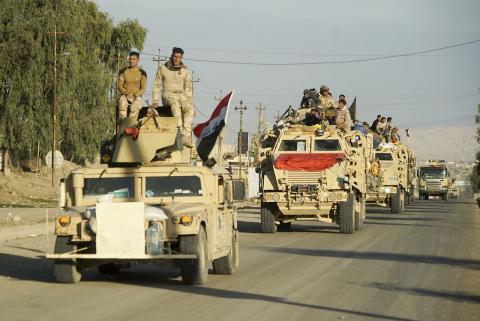
In December 2015, following its fifth review of Iraq, the United Nations Human Rights Committee (HR Committee) issued four priority recommendations to be implemented within one year.
The recommendations urged Iraq to address, among other things, human rights violations in the context of the ongoing armed conflict, the execution of the death penalty, and the prohibition of torture and ill-treatment. Implementing these recommendations would ensure compliance with the International Convention on Civil and Political Rights (ICCPR), which Iraq ratified in 1971.
As the HR Committee will review the implementation of these recommendations during one of its upcoming sessions, Alkarama submitted its own follow-up report on October 6, 2017, in which it highlights the fact that these priority issues have not been addressed over the past two years.
Violations committed in the name of counterterrorism
In Iraq’s follow-up report, the authorities draw attention to the crimes committed by the Islamic State (IS), but fail to address the human rights abuses committed by the Iraqi army and state-sponsored militias in the context of the ongoing armed conflict between IS and the central government.
Among the violations committed by the Iraqi security forces and the Popular Mobilisation Units (PMU), an umbrella organisation composed of 67 militias currently embedded in the Iraqi army, are extrajudicial killings, torture, and the widespread and systematic practice of enforced disappearance against people suspected of alleged ties with IS.
Since 2014, Alkarama has submitted nearly 100 cases of enforced disappearances in Iraq to the Committee on Enforced Disappearances (CED). Iraq’s follow-up report claims “there is no impunity in Iraq when a crime is found to have taken place,” without providing any further information on investigations allegedly carried out.
Furthermore, contrary to what the Iraqi government claims, humanitarian assistance is not provided “without discrimination” to the forcibly displaced population fleeing clashes between the government forces and IS.
Alkarama received numerous testimonies in 2016 according to which Sunni civilians fleeing the besieged city of Fallujah were summarily executed under the pretext that they were supporting IS. Other inhabitants were detained in order to “determine their involvement with IS” and reported having been severely tortured. Similar patterns were observed during the government’s offensive to retake Mosul from IS between June 2016 and July 2017.
Such practices constitute a crime against humanity as defined in the Rome Statute of the International Criminal Court.
Death penalty imposed following unfair trials
Iraq did not address the Committee’s recommendation to abolish the death penalty in its follow-up report. The Anti-Terrorism Law of 2005, which contains a broad definition of terrorism, mandatorily applies the death penalty to those convicted of committing, or threatening to commit, acts of terrorism. Most recently, on September 25, 2017, 42 people were executed on “terrorism” charges.
In its own report, Alkarama recalled that most of the prisoners executed in Iraq are convicted on the basis of the Anti-Terrorism Law. The death sentences are handed down by the Central Criminal Court of Iraq (CCCI) – a jurisdiction infamous for its lack of impartiality and independence – which systematically considers confessions extracted under torture as evidence.
The use of torture by Iraqi authorities
Regarding the issue of torture, the HR Committee asked Iraq to take a number of steps in order to eradicate this practice. Contrary to the Committee’s request, torture is yet to be criminalised under the Iraqi Criminal Code. Furthermore, Iraq’s follow-up report makes no reference to the country’s obligation to carry out prompt, thorough and impartial investigations into all allegations of torture and death in custody.
Alkarama notes that the filing of complaints by victims’ relatives of human rights violations – namely torture, suspicious deaths in custody, and enforced disappearances – with the relevant authorities never leads to the opening of an investigation.
In recent years, Alkarama has continuously received accounts of torture and other ill-treatment at the hands of the Iraqi security services or state-affiliated militias, indicating that this practice is widespread and systematic.
For example, Salih Al Dualimi, a 47-year-old professor, was arrested in 2015 and sentenced to death by the CCCI following a deeply flawed trial. On May 12, 2016, he was condemned on the basis of self-incriminating statements which he was forced to sign under torture during three months of incommunicado detention.
Although the state claims that under Iraqi law, confessions cannot be extracted by coercion, in practice, Iraqi courts give undue weight to confessions when evaluating evidence.
Alkarama will continue to monitor the implementation of the Committee’s recommendations within the next year as Iraq is expected to submit its sixth periodic report to the Committee on November 6, 2018.
For more information or an interview, please contact media@alkarama.org (Dir: +41 22 734 1008).
